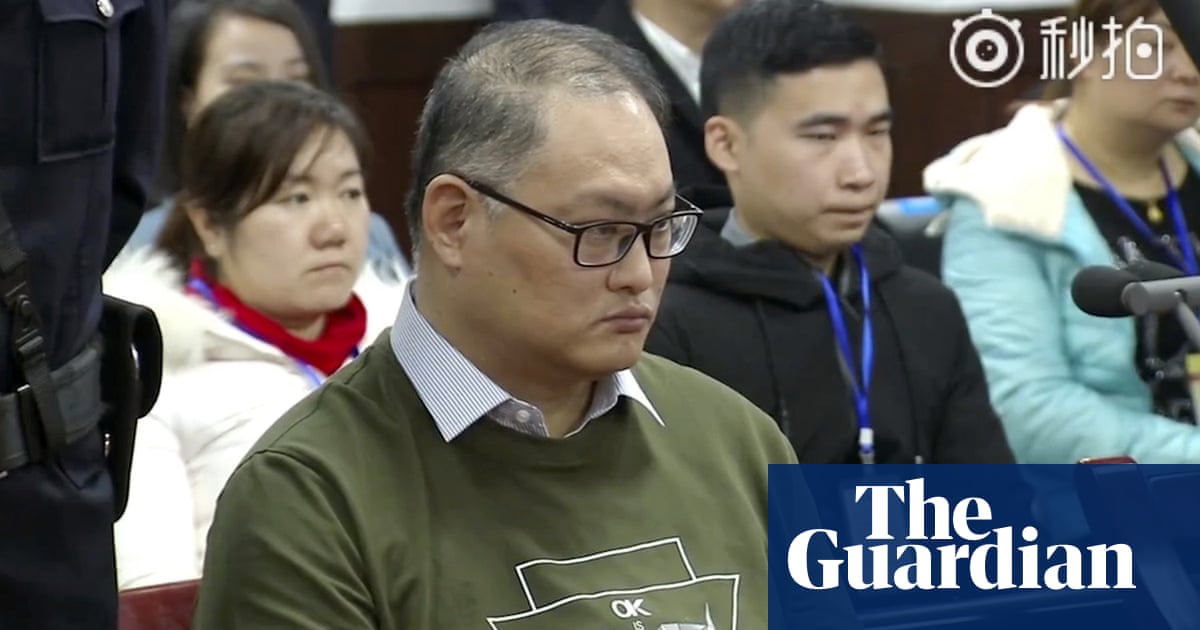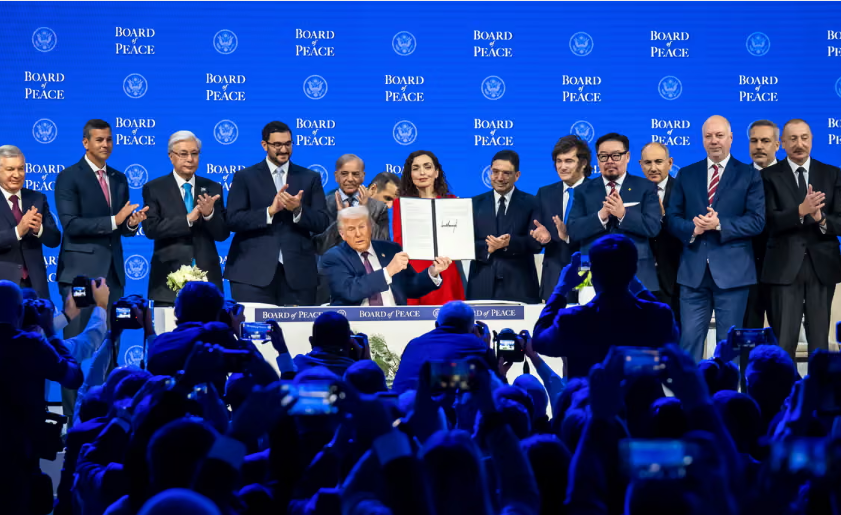Taiwanese activist Lee Ming-che: ‘I can breathe in the fresh air of freedom’
Lee Ming-che and his wife, Ching-yu, sit side by side at an ornate round table, wearing matching crisp white shirts with pages of notes in front of them. The couple have plenty to say after a five-year campaign to free Lee from a Chinese prison.
Now in his late 40s, Lee is visibly slimmer than in photos of his appearance in a Chinese court in late 2017. His hair is thinner and greyer, his brow a little furrowed. Over the course of an hour-long interview, he and his wife stay close, touching or holding each other’s hands and faces, sharing looks between them as if to catch up on those lost in the half decade, smiling in seeming disbelief at hearing each other’s voice.
“I feel I can breathe in the fresh air of freedom, and I’m happy to be reunited with family again,” Lee says.
His sudden return to Taipei last week, after serving five years in China’s Chishan prison on charges of subversion, made headlines across Taiwan. His disappearance in early 2017 and subsequent sentence had sparked international campaigns for his freedom and further soured relations between Taiwan and China. The case echoed that of Hong Kong’s Causeway Bay booksellers less than two years earlier, and chilled those who travelled to China holding views unfavourable to the Communist party.
Lee is a human rights activist, a community college administrator and a former member of Taiwanese political parties including the Democratic Progressive party (DPP). In March 2017 he was on his way to China to meet a friend, travelling via Macau to cross into the mainland at Zhuhai city, in Guangdong.
“When I entered into Guangdong I was immediately detained by the national security department on the crime of committing incitement to subvert state power,” he recalls. “They put a black cloth over my face and put me in a car.”
Friends believed at the time of his disappearance that he had been targeted for hosting WeChat discussions about Taiwanese democracy. He says he was also helping Chinese political prisoners and their families during a time that reminded him of Taiwan’s White Terror decades of martial law.
“Authorities would isolate the families and the political prisoners – it is a necessity of a dictator to isolate them so they feel lonely,” he says. “I was transferring the knowledge of how Taiwan can become more democratic, and gave the Chinese human rights workers a knowledge weapon to use with authorities.”
From Guangdong, Lee was taken into residential surveillance at a designated location (RSDL), China’s notorious form of secretive detention without charge or trial, used against tens of thousands of people. Lee describes it as “an abduction”. Authorities confirmed his detention in late March and said he was in good health, but gave no other details until his formal arrest in May that year. He was charged with subverting state power and moved out of RSDL.
E-Ling Chiu, the national director of Amnesty International Taiwan, said the process of arrest and detention used against Lee were against international human rights laws and standards. “The crime is always misused for dissidents or human rights defenders in China,” she said.
‘Legal means are quite useless’
Lee Ching-yu, a researcher on Taiwan’s period of martial law known as White Terror, became a vocal advocate for her husband’s release. Her boss, Shih Ming-teh, a well-known Taiwanese activist who spent a total of 25 years in prison during and after White Terror, became a close adviser.
“He told me that when there is a difference in civilities, between dictatorship and democracy, legal means are quite useless so you must find other ways. So I was inspired to go and look for my husband,” she says.
Her advocacy – including a dramatic thwarted attempt to board a flight to China and search for him in early April 2017 – attracted criticism, but she says her husband’s conditions would improve every time there was international focus on his case. After his disappearance, Taiwan’s government demanded answers. It accused China of obstructing the truth and damaging cross-strait relations, and the president, Tsai Ing-wen, said she was monitoring it personally. Over the coming months the case would go before the UN working group on human rights and the US Congress, and would attract the support of the EU parliament.
Lee Ching-yu in April 2017. Photograph: Nicola Smith/The Guardian
Lifting an arm to adjust her glasses, the edge of tattoos that Ching-yu had inked before her husband’s Henan trial in September 2017, reading “Lee Ming-che, I am proud of you”, peek from beneath a cuff.
“If not for the international media attention, the release would have been more difficult and his treatment would have been more severe,” she says.
At the trial Lee confessed to spreading messages on Taiwan’s democracy and supporting Chinese political prisoners and their families, two things he says are normal in any democratic country, “but when it happens in China it becomes a claim of subversion of state power”.
No regrets
Beijing considers Taiwan a province of China and intends to one day retake it. Taiwan’s DPP government says Taiwan is a sovereign nation. Beijing cut ties after Tsai’s election in 2016, and Chinese authorities take an increasingly dim view of proponents of democracy, especially those from Taiwan.
On 28 November 2017 he was sentenced to five years at Chishan labor prison. He and his supporters allege he was subjected to inhumane treatment, made to eat rotten food, forced into illegal amounts of labour, and frequently denied contact with family. He was denied a visit home for his father’s funeral in 2019. Ching-yu could visit for just 30 minutes at a time, but after criticising prison conditions she was temporarily banned. Then came the Covid pandemic, further restricting visits.
“Shih said what a political prisoner fears the most is that they’ll be forgotten in jail,” says Ching-yu. “I would have 30 minutes every month to meet Ming-che, and my boss told me to use it wisely. Do not cry. Tell him how much the world and I have done for him … There was a lot of worry inside of me that he would be changed into a man I could no longer recognise. But it was the man I fell in love with who returned.”
The couple found out Lee was coming home at about the same time, just days before his flight. Lee feared he would be released from prison but forced to stay in China, until guards asked him for personal details to book a flight. For five years Lee had imagine seeing his wife at the airport as he stepped on to Taiwanese soil. Instead he was whisked through Taiwan’s strict quarantine requirements and taxied to the centre, where he finally saw Ching-yu – through a pane of glass.
Ching-yu smiles and cries as she recalls the night. “We spoke on the phone for 16 hours. He shared a lot of his experiences from jail,” she says.
Since Lee was first jailed, the rule of Xi Jinping over China has hardened. Relations between Taiwan and Beijing are their worst in decades. Activists and dissidents have been arrested, and millions of people have been subjected to religious and cultural oppression in Xinjiang. Lee notes there are four Taiwanese political prisoners in Chinese jails, and he calls for more global attention on Ilham Tohti, a Uyghur economist jailed since 2014 with no outside contact.
Lee remains adamant of his innocence and unapologetic for his work, which he intends to continue. “The work I have done was for human rights and for humanity, so I had no regrets for what I did,” he says. “Because of my faith in it I have no doubt in what I did and I had confidence in my wife and her boss and my country Taiwan, and believed I was not abandoned.”













